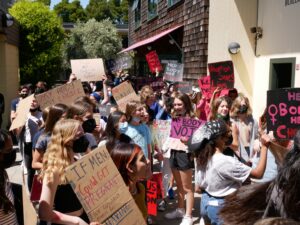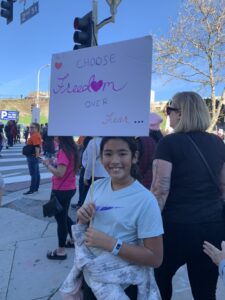November 5, 2024–The day after the 2024 presidential election, emotions rippled throughout the halls of Lick-Wilmerding High School. Following an all-school meeting, students met with their respective advisories to process their emotions surrounding the election’s outcome. During these discussions, one idea gained momentum: the need for LWHS to introduce a new affinity space for women-identifying students. This need for action materialized later that day, at lunch.
“After the election, I felt heartbroken and determined,” Vivi Nesmith ’26, a woman-identified LWHS student and participant in the affinity space disclosed, “Trump having credible rape accusations and still being elected as President felt like a slap in the face and a really scary message to send young people. But alongside the grief I felt and saw, I think there was also a strengthening of resolve in refusing to give up on the push for equality and respect.”

photo courtesy of Mika Jagannathan
This election marked a defining moment, particularly for women, whose futures felt deeply intertwined with the outcome. The group provided a space for young women to reflect on their emotions in the wake of the election. With Donald Trump’s prevail—a candidate who not only openly advocates for the removal of reproductive rights and carries a lengthy history of sexual assault allegations against him, but faces no accountability for it—the stakes were clear: women’s rights stand on precarious ground, and a reaction was not only inevitable yet vital.
“You’re always going to be making progress, and then something will push you back to where you were before, and you just keep having to fight further,” woman identifying student, Sona Kempner ’26, said.
This local effort mirrors a broader cultural shift: feminism itself is evolving. In a world increasingly shaped by intersectionality and digital connectivity, the feminist movement has continued to adapt to women’s ever-changing needs. However, with the results of the election reintroducing past battles, such as reproduction rights and the dismissal of sexual harassment, the future of feminism is blurred. This begs the question: where is the modern feminist movement headed?
“What is the definition of feminism and who defines that?” Mika Jagannathan ’27 said.
In recent years, feminism has undergone a significant shift. Historically, it was often narrowly defined, primarily focusing on issues such as women’s suffrage, workplace equality and reproductive rights. While these efforts were groundbreaking, they tended to emphasize a one-size-fits-all approach, centering the experiences of white, middle-class women while leaving the needs of women of color, LGBTQ+ individuals and those from other marginalized communities largely unaddressed. Early feminist movements also leaned into the idea of presenting oneself as “respectable,” discouraging, and even shunning, open discussions and displays of sexuality. In these ways, ‘old feminism’ often lacked the inclusivity that defines much of modern movement.
Today, feminism enters a new age, emphasizing intersectionality and digital activism.
“One of the greatest changes over the years has become that–what most people who have a scholarly understanding of feminism would say–is that it’s become more and more intersectional. It’s become more and more inclusive,” Dr. Kim Bowers said.
As the main focus of feminism shifts, its means of advocacy are also undergoing significant change. Whereas earlier feminism movements primarily relied on large, public demonstrations, today’s feminism finds expression through the platforms of both grassroots activism, such as the LWHS affinity space, and digital advocacy. Social media, for example, has amplified feminist discourse and made it more accessible to younger audiences using the popularity of influencer culture.
On TikTok, Somoan-American influencer Drew Afualo has gained widespread recognition for her unapologetic and humorous takedowns of misogynistic and fatphobic posts, turning her media presence into a space for empowerment and advocacy. Similarly, Jameela Jamil, a British actress with Indian and Pakistani roots, uses Instagram and TikTok as a means to preach body neutrality, encouraging individuals to celebrate their achievements and values over physical features. In October of this year, Jamil received the The Glamour Gamechanging Voice Award for her work.
Other figures who once symbolized controversy have reclaimed their narratives to amplify the voices of marginalized groups and challenge deeply ingrained societal norms, especially surrounding over-sexualizing women in the media.
A prominent example is Mia Khalifa, a Lebanese-American media personality once infamous for her controversial yet short career in the adult entertainment industry. Khalifa has recently fully rebranded and is now a well-known influencer. Using Instagram and X (formerly Twitter), she amplifies the voices of women, predominantly in the Middle East, and criticizes the very industry she was part of for its exploitative practices in coercing young women.
Likewise, Alex Cooper host of Call Her Daddy, a top five nationally ranked podcast five nationally ranked podcasts for women, has shifted her platform from focusing solely on candid discussions of sex and relationships to initiating more politically charged conversations. Early October of this year, she even hosted Vice President Kamala Harris, sparking both controversy and praise while addressing the complexities of today’s feminism.
“At the end of the day, I couldn’t see a world in which one of the main conversations in this election is women, and I’m not a part of it,” Cooper said, beginning the episode with Harris.

photo courtesy of Mika Jagannathan ’27
Yet, despite its promise, digital feminism is not without challenges. While social media is often celebrated as a space for candid self-expression and connection, it frequently falls short of these ideals.
For instance, social media users have had mixed sentiments towards “influencer feminism.” On one hand, many influencers have broadened the audience for feminist ideas, making them more accessible and relatable to women and people of unique backgrounds. On the other hand, many individuals critique “influencer activism” for its seeming superficiality.
“The whole point of [social media] is supposed to be seeing real experiences from your friends. But it’s now become such a big thing about using engagement as profit and more people like creating themselves into images or gimmicks, rather than portraying their real selves,” woman-identifying LWHS student, Kyra Gandhi ’25, said.
Moreover, others feel that while these influencers may be genuine, they don’t portray feminism or facilitate discussions surrounding the movement with enough depth.
“Sometimes I feel like conversations on social media can really oversimplify complex issues around feminism,” said Nesmith.
These conflicting reactions to influencer feminism reflect a tension within its cultural impact. While it has brought feminist discourse into the mainstream, allowing conversations about intersectionality and equity to reach a wider audience, this accessibility often comes at the cost of depth and substance, as complex ideas are condensed into content for maximum engagement.
Against this backdrop, the creation of LWHS’s affinity space for female-identifying students offers a counterpoint; it is an example of how feminist action can manifest locally, even as larger discussions about the movement play out on digital platforms. Unlike social media activism, which often focuses on reach and visibility, affinity spaces provide a space for thoughtful discussions and emotional connections so that realistic changes with personal impacts can be achieved.
As the feminist movement continues to evolve in the face of the controversial digital age, this affinity space is also a reminder that change, while necessary, must be rooted in empathy.
As Bowers stressed, “I think that feminists have to take care of each other. You know, we have to take care of trans women. We have to take care of trans people. We have to advocate for each other, and for our health. If we don’t do that, then we’ve lost our way.”
The 2024 election has brought feminism to a crossroads. With hard-won progress under threat, the question remains: what will the next chapter of the movement look like, and how can feminism stay true to its values while adapting to an ever-changing world?






